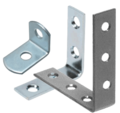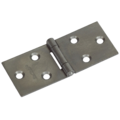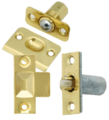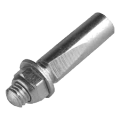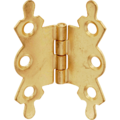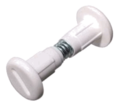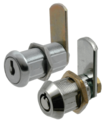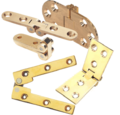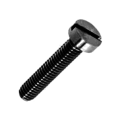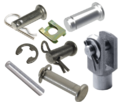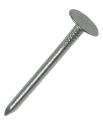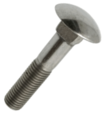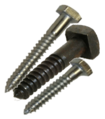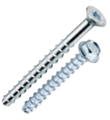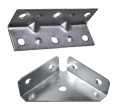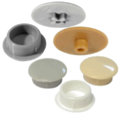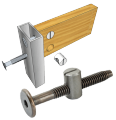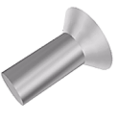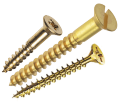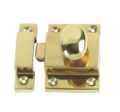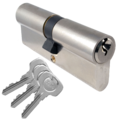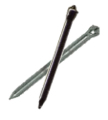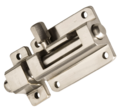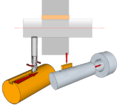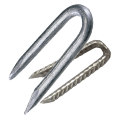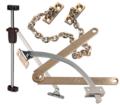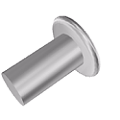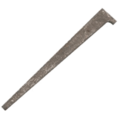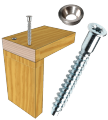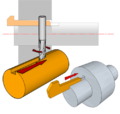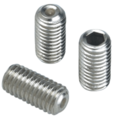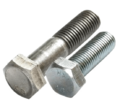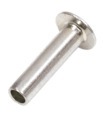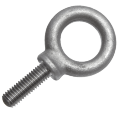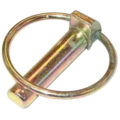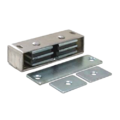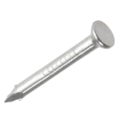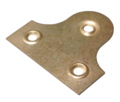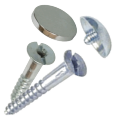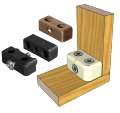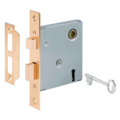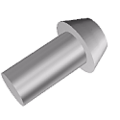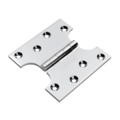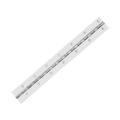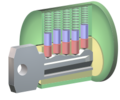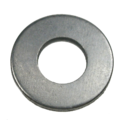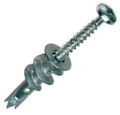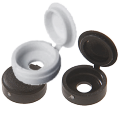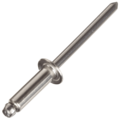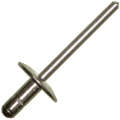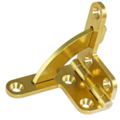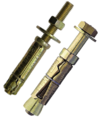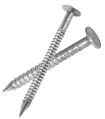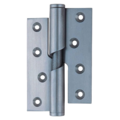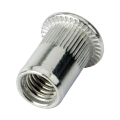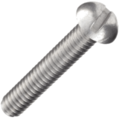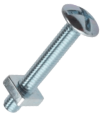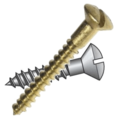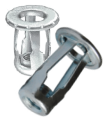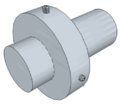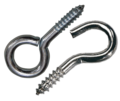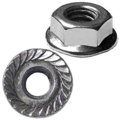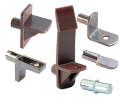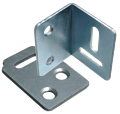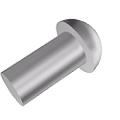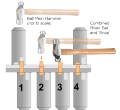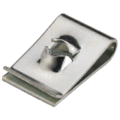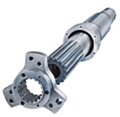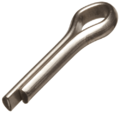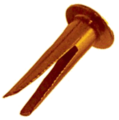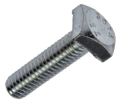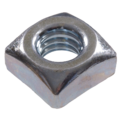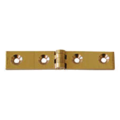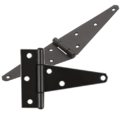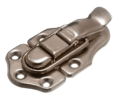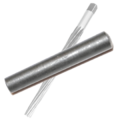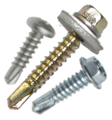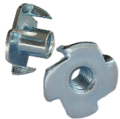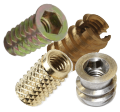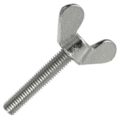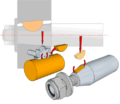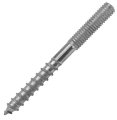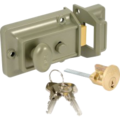Fixings and Fastenings: Difference between revisions
From DT Online
mNo edit summary |
mNo edit summary |
||
| Line 1: | Line 1: | ||
===== Materials may be joined together: ===== | ===== Materials may be joined together: ===== | ||
| Line 4: | Line 5: | ||
* chemically ''(e.g. with glue)'', | * chemically ''(e.g. with glue)'', | ||
* by heat ''(e.g. soldering or welding)''. | * by heat ''(e.g. soldering or welding)''. | ||
===== In addition, connections may be: ===== | ===== In addition, connections may be: ===== | ||
Latest revision as of 12:12, 24 June 2016
Materials may be joined together:
- mechanically (e.g. using interlocking joints, nails and screws),
- chemically (e.g. with glue),
- by heat (e.g. soldering or welding).
In addition, connections may be:
- permanent (i.e. not intended to be taken apart) - usually achieved by gluing, welding, or brazing for example;
- semi-permanent (i.e. possible to take apart for reclamation, alteration or repair, but not the prime intention) - using nails, screws, rivets or stitching for example;
- temporary (i.e. designed with the intention of being easily removable for replacement or maintenance etc.) - using nuts and bolts, keys and keyways, press studs, knock-down (KD) fittings.
Note: The classification of fastenings in this way is somewhat arbitary and there are always exceptions (e.g. an Antiques Restorer may choose to use Hot Animal Glue because, with the application of heat, any restoration work done can be reversed if neccessary and, in this regard, some Glues may be regarded as semi-permanent).
Pages in category 'Fixings and Fastenings'
The following 10 pages are in this category, out of 10 total.
Media in category 'Fixings and Fastenings'
The following 136 files are in this category, out of 136 total.
- AeroNuts2.png 424 × 286; 49 KB
- AngleBrackets.png 376 × 353; 32 KB
- BackFlap.png 1,000 × 1,000; 367 KB
- BallRollerCatch.png 460 × 506; 59 KB
- BicycleCotterPin.png 225 × 225; 29 KB
- BoxCorners.png 845 × 486; 105 KB
- BoxLock.png 120 × 160; 31 KB
- ButterflyHinge.png 800 × 800; 576 KB
- ButtHinges.png 654 × 492; 87 KB
- CabinetConnectorScrew.png 350 × 312; 18 KB
- CamLockConnections.png 708 × 556; 73 KB
- CamLocks.png 524 × 610; 81 KB
- CapScrew.png 252 × 200; 57 KB
- CardTableHinges1.png 593 × 566; 86 KB
- CheeseHdScrew.png 225 × 225; 26 KB
- Circlips.png 484 × 439; 54 KB
- ClevisPins.png 704 × 598; 107 KB
- ClevisPinsClips.png 398 × 303; 29 KB
- CloutNail.png 341 × 397; 16 KB
- CoachBolt.png 266 × 304; 15 KB
- CoachScrews.png 524 × 596; 82 KB
- ConcreteScrewAnchors.png 358 × 390; 30 KB
- CornerAngleBrace.png 452 × 408; 53 KB
- CorrugatedFasteners.png 454 × 341; 49 KB
- CoverCaps.png 719 × 684; 67 KB
- CrossDowels.png 608 × 628; 64 KB
- CskHd.png 125 × 125; 6 KB
- CskHdMachineScrew.png 267 × 200; 16 KB
- CskHdWoodscrews.png 520 × 444; 63 KB
- CupboardCatch.png 313 × 293; 67 KB
- CylinderLock.png 1,600 × 1,600; 1.45 MB
- DeepDrivePanelPins.png 246 × 273; 10 KB
- DomedNut.png 224 × 224; 32 KB
- DoorBolt.png 402 × 376; 46 KB
- DoubleBallRollerCatch.png 408 × 318; 35 KB
- DovetailNailingPunching.png 500 × 938; 80 KB
- DrawerCupboardLocks.png 599 × 501; 70 KB
- DrilledKeyAssy.png 607 × 360; 17 KB
- Drilling for Woodscrews.png 1,400 × 807; 1.09 MB
- Escutcheons.png 642 × 650; 102 KB
- European-hinge.png 300 × 232; 61 KB
- EyeBolt.png 600 × 600; 86 KB
- Eyelet.png 252 × 208; 26 KB
- FastFixHinge.png 500 × 352; 48 KB
- FeatherKeyAssy.png 500 × 449; 16 KB
- FenceStaples.png 473 × 489; 59 KB
- FlagHinges.png 675 × 500; 70 KB
- FlapStays.png 600 × 524; 76 KB
- FlatHd.png 125 × 125; 5 KB
- FlatPackFittings.png 463 × 296; 38 KB
- FloorBrad.png 341 × 322; 12 KB
- FurnitureConnectorNuts.png 500 × 390; 53 KB
- FurnitureScrews.png 508 × 564; 70 KB
- GibHeadKeyAssy.png 500 × 475; 18 KB
- GripIt2.png 554 × 407; 32 KB
- GrubScrew.png 234 × 246; 21 KB
- GrubScrewFlat.png 500 × 388; 18 KB
- Hairpin.png 219 × 145; 19 KB
- HexHdBoltScrew.png 554 × 491; 85 KB
- HexNut.png 314 × 260; 15 KB
- Hinges.png 828 × 600; 93 KB
- HollowRivet.png 250 × 292; 15 KB
- LidStays.png 856 × 672; 113 KB
- LiftingEye.png 442 × 424; 41 KB
- LinchPin.png 225 × 225; 63 KB
- MagneticDoorCatch.png 500 × 500; 112 KB
- MasonryNail.png 225 × 225; 18 KB
- MirrorPlate.png 350 × 297; 88 KB
- MirrorScrews.png 476 × 494; 50 KB
- ModestyBlocks.png 672 × 630; 71 KB
- MortiseLock.png 400 × 400; 74 KB
- NutBolt.png 266 × 190; 44 KB
- NutsBolts.png 500 × 320; 79 KB
- OvalWireNails.png 360 × 435; 19 KB
- PanelConnectors.png 954 × 696; 114 KB
- PanelPins.png 322 × 435; 23 KB
- PanHd.png 125 × 125; 5 KB
- Parliament.png 900 × 900; 215 KB
- PianoHinge.png 500 × 500; 71 KB
- Pin tumbler with key.svg.png 230 × 192; 31 KB
- PlainWasher.png 800 × 800; 438 KB
- PlasterboardFixing.png 308 × 294; 18 KB
- PlasticScrewCover.png 392 × 369; 36 KB
- PopRivet.png 500 × 500; 27 KB
- PopRivet1.png 500 × 500; 32 KB
- QuadrantHinge.png 800 × 800; 427 KB
- RawlboltAnchors.png 420 × 495; 54 KB
- RawlHookEye.png 578 × 466; 60 KB
- RepairPlates.png 840 × 554; 139 KB
- RepairWasher.png 342 × 202; 56 KB
- RingNails.png 416 × 473; 22 KB
- RiseFallHinge.png 360 × 360; 77 KB
- RivetNut.png 360 × 360; 102 KB
- Rivetting.png 421 × 302; 25 KB
- RndHdmachineScrew.png 456 × 448; 40 KB
- RndWireNail.png 303 × 397; 15 KB
- RollPin1.png 388 × 310; 25 KB
- RoofingNutBolt.png 244 × 286; 16 KB
- RsdHdCskWoodscrews.png 360 × 362; 29 KB
- ScrewAnchor.png 314 × 356; 37 KB
- ScrewCups.png 438 × 308; 41 KB
- ScrewedCollarPlainShaft.png 500 × 443; 20 KB
- ScrewHooksEyes.png 602 × 508; 72 KB
- SecurityBolt.png 600 × 386; 106 KB
- SerratedFlangeLocknut.png 225 × 225; 62 KB
- ShelfSupports.png 735 × 639; 96 KB
- ShrinkageBracketsPlates.png 604 × 576; 81 KB
- SlotHdCastleNutPin.png 502 × 388; 66 KB
- SnapHd.png 125 × 125; 5 KB
- SnapHeadRivetting.png 454 × 416; 20 KB
- SossHinges.png 384 × 553; 72 KB
- SpireNut(aka U Nut).png 500 × 500; 202 KB
- Splines.png 500 × 487; 66 KB
- SplitPin.png 500 × 469; 43 KB
- SplitRivet.png 272 × 275; 21 KB
- SqHdScrew.png 202 × 178; 11 KB
- SquareNut.png 900 × 900; 692 KB
- SquareShaft.png 500 × 405; 14 KB
- StrapHinge.png 227 × 227; 17 KB
- StrapTeeHinges.png 500 × 484; 26 KB
- Stud.png 480 × 298; 45 KB
- SuitcaseCatch.png 266 × 238; 21 KB
- SurfaceLimitingDoorWindowStays.png 894 × 572; 77 KB
- Tacks.png 397 × 511; 47 KB
- TailboardLatch.png 600 × 459; 200 KB
- TaperPinReamer.png 406 × 420; 24 KB
- TecScrews.png 464 × 498; 71 KB
- TeeNutInsert.png 180 × 178; 39 KB
- ThreadedInserts.png 418 × 390; 69 KB
- UpholsteryTacks.png 435 × 322; 37 KB
- WingBolt.png 324 × 324; 19 KB
- WingNut.png 316 × 159; 60 KB
- WoodruffKeyAssy.png 500 × 434; 20 KB
- WoodScrewStud.png 358 × 366; 11 KB
- WorktopConnectionBolt.png 500 × 336; 52 KB
- YaleLock.png 220 × 220; 53 KB

